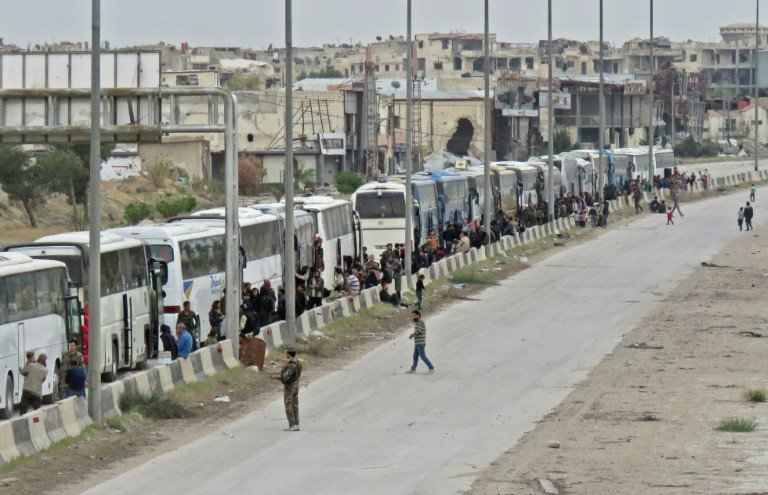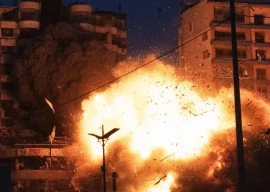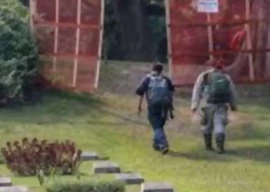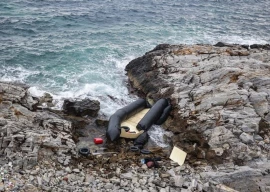
A blistering Russian-backed assault since February 18 on the last opposition bastion near Damascus had splintered rebel territory into three shrinking pockets, each held by different factions.
Damascus and its ally Moscow have implemented a "leave or die" strategy with deadly air strikes on the enclave as they look to end six years of opposition control.
State television said the town of Harasta had "been emptied of terrorists" after a deal that saw fighters from militant group Ahrar al-Sham and their families bussed to northwestern Idlib province, still largely rebel-held.
The evacuation extended regime dominance to over 90 percent of the bombed-out Ghouta enclave that the rebels have clung to through years of punishing government siege, a Britain-based war monitor said.
President Bashar al-Assad's forces look set to expand their control soon over another key area after militant group Faylaq al-Rahman struck a deal to evacuate starting at 0700 GMT on Saturday.
The agreement will see a southern stretch of territory that includes the towns of Zamalka, Arbin and Ain Tarma cleared, while talks are under way over the third and final pocket, around Ghouta's main town of Douma.
First fighters evacuated from Syria's Ghouta as food goes in
The withdrawal deal came after Russian air strikes using "incendiary munitions" hit the town of Arbin late Thursday, killing 37 civilians, according to the Britain-based Syrian Observatory for Human Rights. AFP reporters saw similar munitions fall on Douma.
But Russia denied it was carrying out any such strikes.
Each one of the three pockets has come under intense bombardment, essentially forcing the rebels who control them to sue for an exit in a tactic commonly used by Assad's forces in Syria's seven-year war.
The Observatory says that more than 1,600 civilians have been killed in just over a month.
Harasta's evacuation — which began Thursday — came as part of a deal negotiated by Russia.
Syrian state media reported more than 4,500 people including over 1,400 fighters left.
Fighters and civilians on Friday loaded onto a fleet of 50 buses in a buffer zone outside their former bastion before beginning the journey to Idlib.
Syria regime enters key rebel-held Ghouta town: monitor
The head of the rebel-controlled local council in Harasta, Hossam al-Beiruti, described a pitiful scene as he and other residents readied to leave their town.
"They came out from under the rubble. They came out of cellars they had been buried in without food," he told AFP by phone.
"They emerged back to life despite their feelings of abandonment by the international community."
The first batch of fighters to leave Ghouta arrived at a camp in Idlib province on Friday after spending the night on the edge of rebel-held territory.
"Our situation in Harasta was very tragic," Abu Mohammed, a civilian told AFP in the town of Maarat al-Ikhwan.
"We couldn't live above ground because of the heavy bombardment... Some children stayed in basements for four months with no food. We couldn't even find fodder to eat."
Retaking Eastern Ghouta, a sprawling semi-rural area which had escaped government control since 2012 and lies within mortar range of central Damascus, was made a priority this year after a string of regime gains.
On the regime-held side of Harasta, an AFP correspondent said Syrian soldiers fired celebratory gunshots into the air after they heard of the deal to evacuate the second pocket of the enclave.
Ahrar al-Sham had made some demands in talks before the evacuation but were pummelled into accepting whatever conditions were imposed to them.
"The one thing they got was that they were able to leave without being killed," said Nawar Oliver, an analyst at the Turkey-based Omran Centre.
Some 80 civilians were reported killed on Thursday in bombardments of the territory held by Faylaq al-Rahman before they sealed a deal for some 7,000 people to leave.
"The humanitarian situation continues to be catastrophic, with no food, emergency items nor medical supplies and outbreaks of disease due to civilians stuck in crowded and insalubrious basements," Faylaq al-Rahman spokesman Wael Alwan told AFP before the deal.
"There are cases of lice and scabies," the Turkey-based spokesman said.
AFP video and pictures from Douma, which is controlled by the rebel faction Jaish al-Islam, showed bright white streams falling from the sky in a fashion consistent with incendiary munitions.
Jaish al-Islam too opened negotiations with Russia.
The offensive on Eastern Ghouta has caused widespread outrage and marked one of the darkest episodes of a war that entered its eighth year this month.

1732569774-0/Baymax-(2)1732569774-0-165x106.webp)















COMMENTS (1)
Comments are moderated and generally will be posted if they are on-topic and not abusive.
For more information, please see our Comments FAQ